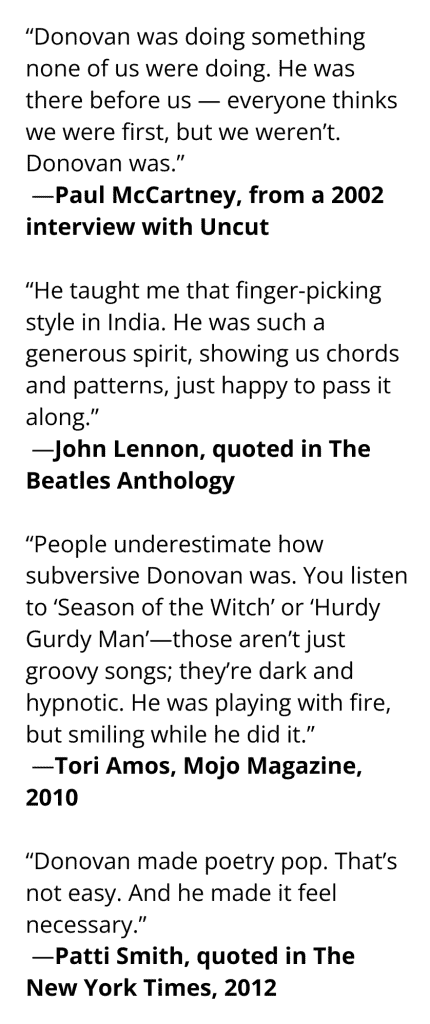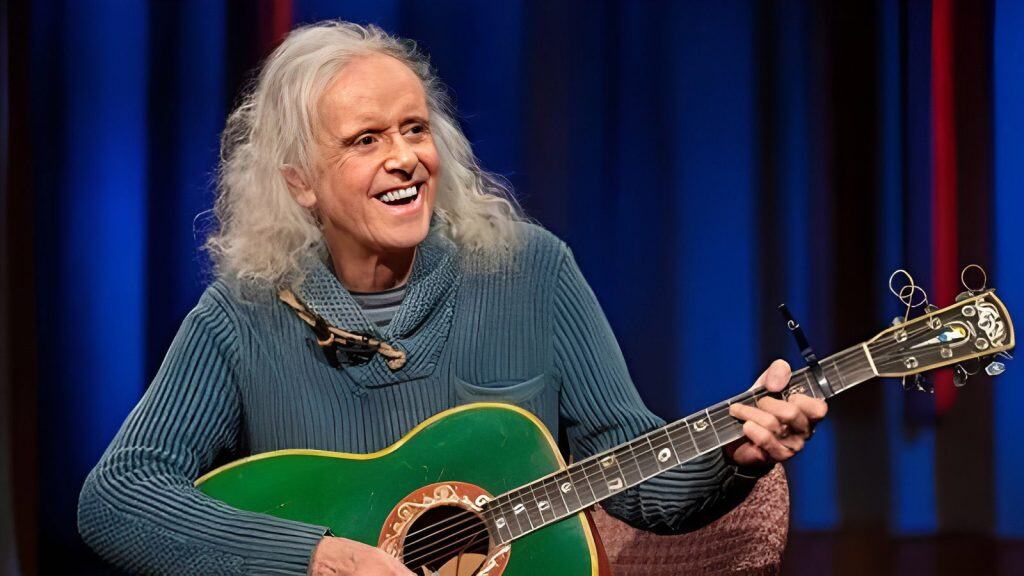On a spring morning in 1966, a slender young man with a soft brogue and an acoustic guitar walked into a London studio and recorded a song that would, with time, become something like an incantation. “Sunshine came softly through my window today,” he sang, in a lilting voice that seemed to smile even as it drifted. The man was Donovan Leitch—born in Glasgow, raised in Hertfordshire—and the song was “Sunshine Superman,” a curious and charismatic fusion of folk whimsy and electric ambition. Nearly six decades later, on the occasion of Donovan’s seventy-ninth birthday, that same spectral tone continues to reverberate, a sound at once utterly of its moment and somehow outside of time.
 To understand Donovan is to engage with a set of contradictions. He is both of the folk revival and beyond it; a protest singer and a mystic; a pop star and a wandering bard. He was hailed early on, perhaps a touch too eagerly, as the “British Bob Dylan”—a comparison that clung to him like incense smoke, often obscuring rather than illuminating his distinct sensibility. Where Dylan dealt in irony and confrontation, Donovan trafficked in wonder, in the textures of the natural world and the metaphysical hints that lay just beyond it.
To understand Donovan is to engage with a set of contradictions. He is both of the folk revival and beyond it; a protest singer and a mystic; a pop star and a wandering bard. He was hailed early on, perhaps a touch too eagerly, as the “British Bob Dylan”—a comparison that clung to him like incense smoke, often obscuring rather than illuminating his distinct sensibility. Where Dylan dealt in irony and confrontation, Donovan trafficked in wonder, in the textures of the natural world and the metaphysical hints that lay just beyond it.
Born in 1946 to working-class parents, Donovan came of age in post-war Britain, absorbing the Anglo-Scottish ballads of his heritage and the imported twang of Woody Guthrie. He taught himself guitar while recovering from polio, a fact that feels almost fated in retrospect. By the time he emerged on the British folk scene in the early 1960s, he was already cultivating the image he would ride to fame: a gentle troubadour with a harmonica slung around his neck and poems tucked into the pockets of his denim jacket.
His first single, “Catch the Wind” (1965), revealed an uncanny capacity for quiet intimacy. But it wasn’t until Sunshine Superman (1966) that Donovan truly found his voice—a baroque, psychedelic one that borrowed from Carnaby Street as much as from Canterbury. The album, an ambitious swirl of sitars, harpsichords, and backward tape loops, helped establish a new genre: psychedelic folk. Donovan, with his guileless smile and fluttering vocals, seemed to float above the turbulence of the times, offering not protest but dreamscape.
The subsequent hits—“Mellow Yellow,” “Hurdy Gurdy Man,” “Atlantis”—are less songs than spells. “Mellow Yellow” flirted with scandal and absurdism, rumored to be about smoking banana peels (it wasn’t) or, depending on who you ask, vibrators (closer to the truth). “Hurdy Gurdy Man,” a darker, droning piece written in India during his famed 1968 retreat with the Beatles and Maharishi Mahesh Yogi, hinted at a more complex artist lurking beneath the flower garlands. That same retreat, immortalized in Beatle lore, saw Donovan teaching Lennon and McCartney a fingerpicking technique that would shape “Dear Prudence” and “Blackbird.” He was, in this way, a peripheral figure to greatness and also—quietly, unmistakably—great himself.
Donovan’s music, for all its hippie trappings, holds up not because it’s quaint, but because it is sincere. He was not playing at being ethereal; he simply was. Even now, listening to “Wear Your Love Like Heaven,” one hears not irony or pastiche but a genuinely held belief in beauty, color, sensation.
In the decades that followed his psychedelic prime, Donovan retreated from the limelight, content to explore other realms—musical, spiritual, ecological. He recorded sporadically, toured quietly, and continued to advocate for Transcendental Meditation and environmental causes. In 2012, he was inducted into the Rock & Roll Hall of Fame, an accolade that seemed both overdue and curiously irrelevant. Donovan’s achievement was never about acclaim but aura.
He remains, at seventy-nine, a figure both remembered and rediscovered—by directors mining his catalog for cinematic effect (Scorsese’s use of “Atlantis” in Goodfellas), by psych-folk revivalists citing him as a touchstone, and by those simply hungry for a bit of unguarded enchantment in their listening. His daughter, Ione Skye, has carved her own niche in American film; his influence, meanwhile, lingers like a melody just beneath the surface.
To revisit Donovan in 2025 is not merely to look back at a more colorful era, but to remember the possibility of unselfconscious artistry—a belief that a song, properly conjured, could change your weather. In a world louder, faster, and ever more cynical, Donovan’s work remains a whispered counterspell.
He once asked us to picture ourselves on a boat on a river, with tangerine trees and marmalade skies. But long before Sgt. Pepper, there was Donovan—humming in the mist, already halfway to Atlantis.
Happy birthday to the hurdy-gurdy man.
Today In History:
- 1954 – Bill Haley and His Comets released “(We’re Gonna) Rock Around the Clock” as the B-side of the single “Thirteen Women (And Only One Man In Town).” “(We’re Gonna) Rock Around the Clock” didn’t become hugely successful on the music charts until the following year when it was re-released after the song appeared on the soundtrack during the opening credits of the hit movie, “Blackboard Jungle.”
- 1962 – The first issue of “The Incredible Hulk” was published by Marvel Comics.
- 1969 – The Moody Blues topped the album chart for the first time with “On the Threshold of a Dream,” which spent two weeks on top.
- 1969 – The Turtles and the Temptations played at the White House at the request of First Daughter Tricia Nixon. Mark Volman of the Turtles fell off the stage five times. There have been persistent rumors ever since that he and the band prepared for the performance by snorting cocaine on Abraham Lincoln’s desk.
- 1969 – Janis Joplin and the Kozmic Blues Band played Cobo Hall in Detroit, with Country Joe & the Fish and Teegarden & Van Winkle as the opening acts.
- 1969 – The National and American Football Leagues announced plans to merge for the 1970-71 season. The combined leagues were to be known as the National Football League (NFL).
- 1972 – Writer/producer (radio serials The Lone Ranger, The Green Hornet and Challenge of the Yukon)/lawyer/publisher/radio station owner (Michigan’s WXYZ-Detroit, WOOD-Grand Rapids, WPON-Pontiac) George W. Trendle died at age 87. A noted penny-pincher, Trendle specified that the music on WXYZ shows should be non-copyrighted classical so that the station would not have to pay royalties or performance fees. This is the reason the “William Tell Overture” was adopted as “The Lone Ranger” theme and “The Flight of the Bumble Bee” became the theme for “The Green Hornet.”
- 1974 – At Criteria Studios in Miami, Eric Clapton recorded “I Shot the Sheriff.”
- 1974 – The Main Ingredient’s single “Just Don’t Want To Be Lonely” was certified Gold.
- 1975 – Apple Records was dissolved.
Today’s Birthdays:
- Fred Astaire was born on this date in 1899. (d, 1978)
- David O Selznick, American Academy Award-winning producer (Gone With The Wind; Rebecca), born in 1902. (d. 1965)
- Long-time NFL announcer Pat Summerall was born on this date in 1930. (d. 2013)
- Dave Mason and Donovan share a birthday today. Both are 79.
- Jay Ferguson is 78.
- U2’s Bono is 65.


